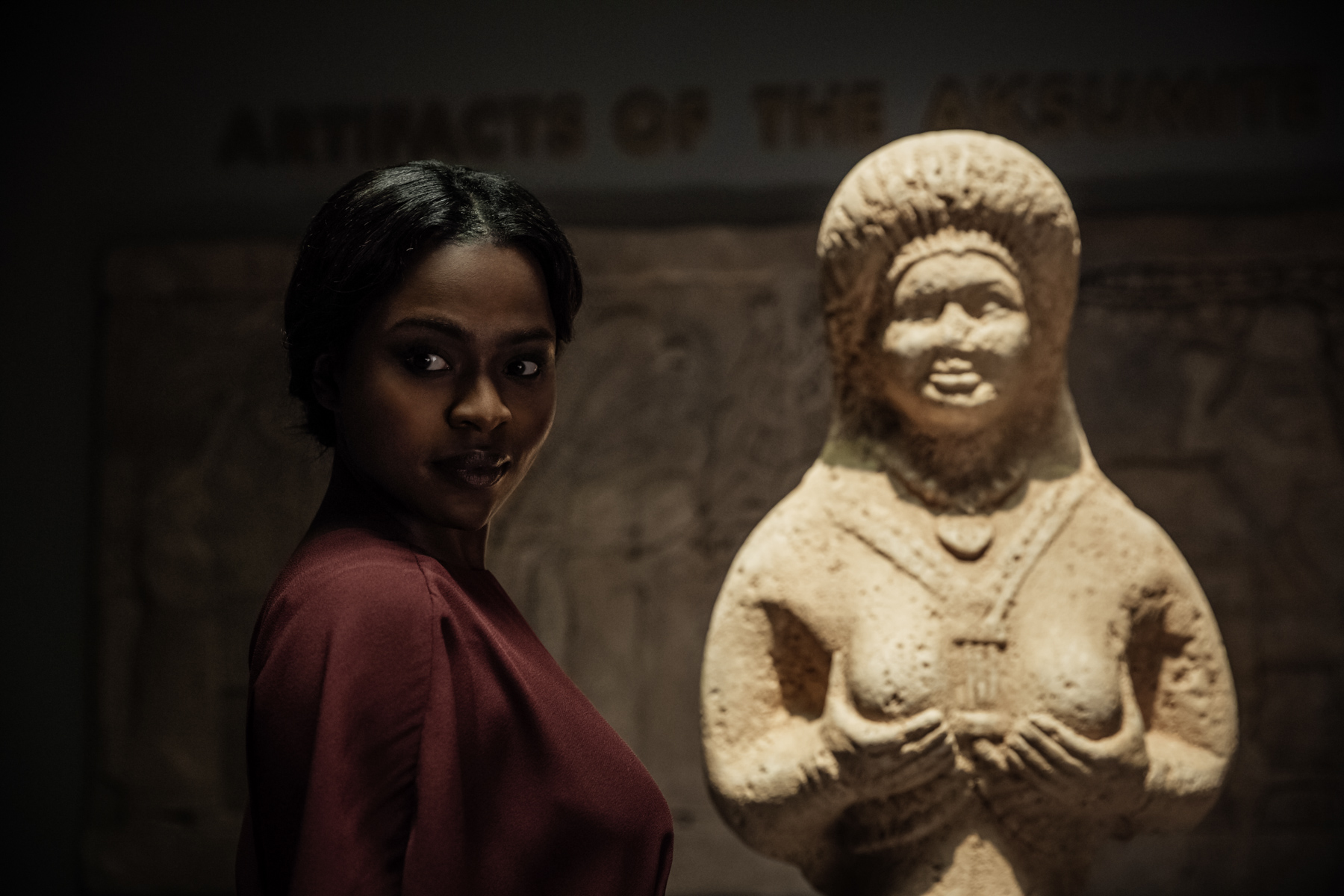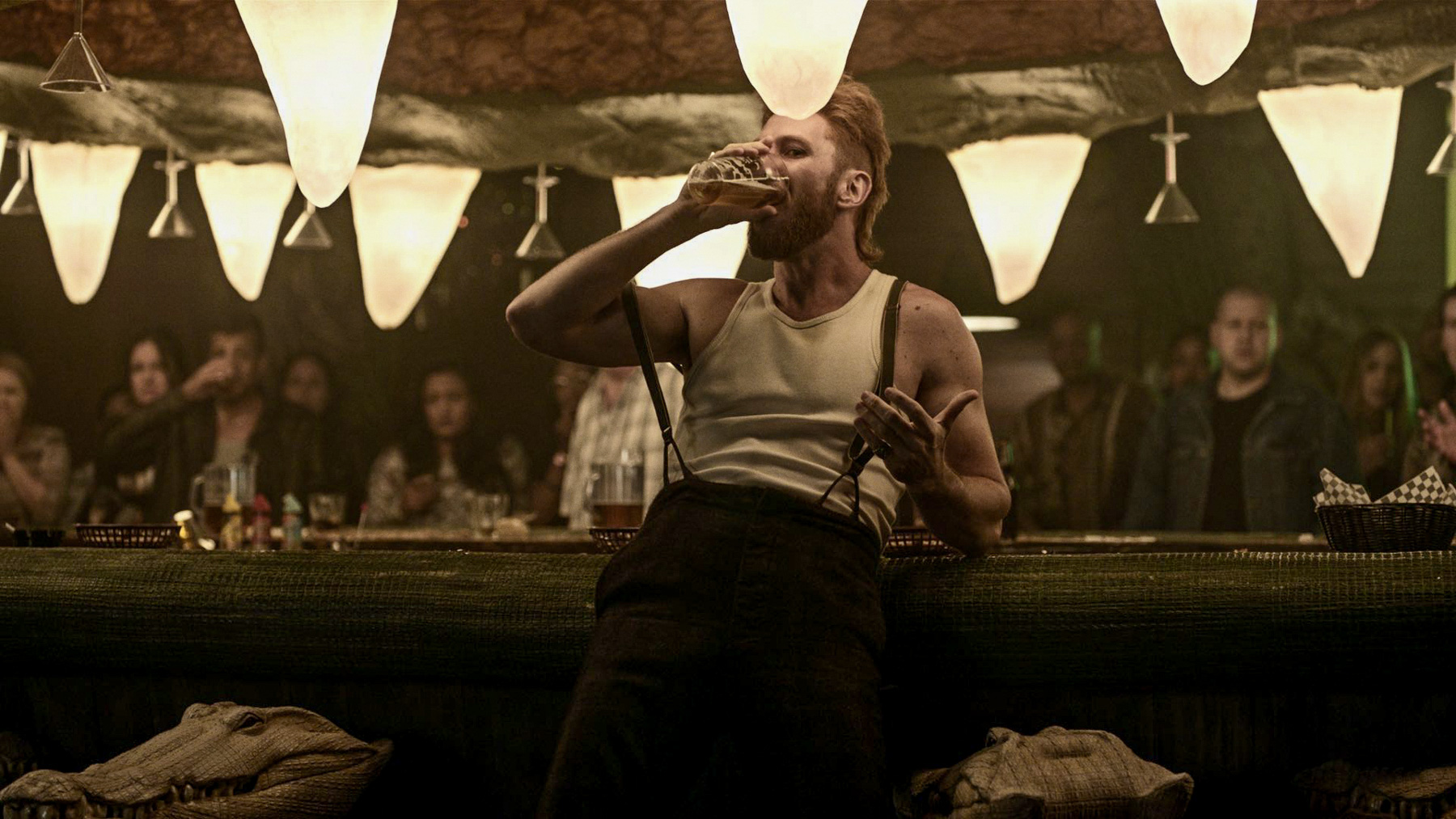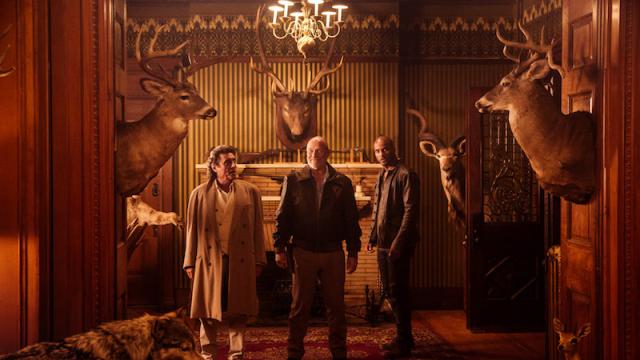America is a country of opportunity, as we’re constantly told. People come here with nothing yet can make themselves billionaires. But there’s a price that immigrants have to pay when they come to this country, an unspoken loss that lies at the heart of American Gods. “We are a country of cultural appropriation,” says executive producer Bryan Fuller.
Image: Starz
What Fuller is talking about is a country where the dominant culture is made up of watered-down bits of other cultures that have been deemed “acceptable.” It’s teenage girls in Navajo prints at Coachella, people who will tell you their “Chinese zodiac” sign, and the turning of henna and bindi into fashion accessories. It’s the way words from Black culture turn into popular slang.
American Gods is the TV adaptation of Neil Gaiman’s novel of the same name. In it, an ex-con named Shadow Moon (Ricky Whittle) finds himself hired to be the driver and reluctant accomplice to a grifter who calls himself Mr. Wednesday (Ian McShane). The two travel across the country on a road trip where Wednesday stops to gather allies in a very particular fight. Wednesday is one of the old gods (there’s a slight hint as to which one in his name), who are exactly what they sound like. These beings are beliefs manifested as people, brought to America by immigrants, and have been forced into assimilating into American culture just like their believers. But now the old gods are being supplanted by America’s new gods — media, the internet, and so on — and must fight for their survival.
American Gods gets at a fundamental paradox of American immigration: America demands that immigrants assimilate, but it never lets them actually forget they’re not from here.
With the exception of Native Americans, everyone in the United States is an immigrant. It’s woven into our national foundation mythology. As far as a lot of schools are concerned, the country begins with “the Pilgrims left England and came here to practice their religion.” That particular way of teaching American slavery — glorifying the Pilgrims and glossing over slavery and indentured servitude — is one of the things that inspired Neil Gaiman to write the book in the first place.
“Somewhere in the ’90s, my son came back from school, aged about twelve, and says, ‘My teacher says you’re a liar,’” explained Gaiman. “And I said ‘What?’ ‘My teacher says you’re a liar. I told them in school and I said that thing you told us about how people were transported to America instead of being hanged or put in prison and they went out to Virginia and they were sold to farmers and things. And she said that’s not true. And that people and Pilgrims only came to America in search for a better life and religious freedom.’
“And I was like, ‘Well, she’s wrong. She can say that I’m a liar if she likes, but I think I will tell that story now because people genuinely do not know it.’”
America loves to see itself as the place where anyone can come and be anything. It’s why the Statue of Liberty has the inscription it does. It’s also why Ellis Island is such a popular destination. Almost everyone, save for the African Americans whose origins were wiped away from slavery, can reel off their family’s immigration story: how many generations back, where they were from, what they have contributed to America.
At the same time, America demands assimilation. This means looking and acting “American,” which means speaking English, wearing jeans and t-shirts, and watching football. The argument against whatever group is considered a threat is usually that they can’t ever be American. The Japanese were considered racially incapable of being Americans at one point. But now, through the magic of assimilation, Asian Americans are held up as the “model minority.” Cities with significant immigrant populations are littered with places like Chinatown, Little Tokyo, Koreatown, etc. As the immigrant populations assimilate, those places stop being genuine ghettos and become tourist attractions. Little Italy in Manhattan, for example, is a brand more than it is an actual home to Italian immigrants and their children.
There’s a moment in an episode of American Gods were an Egyptian immigrant is being told that her son will name his daughter after her. The woman asks if the girl will actually have her name or have a “bullshit middle name.”
I have a “bullshit middle name.” My first name comes from neither my mother nor my father’s culture. My last name was misspelled when my father’s family arrived here; we’ve never fixed it. My middle name is Japanese. Because, after a certain number of generations, middle names are where “ethnic” names live. Immigrant parents face a special conundrum: if you want your kids to fit in, you give them white names. That pragmatism run up against an understandable reluctance to give up on where you came from. Pride, but only so much.

Image:
In American Gods, Yetide Badaki, herself a naturalized American citizen, plays the old god Bilquis, who lives off of love as worship. There’s a scene in the show where Bilquis — also the Queen of Sheba — visits a museum filled with artifacts of the world she originally came from. It’s wordless, but you can see so much in Badaki’s performance. A god reduced to using online dating to get the worship she needs to stay alive, when she used to be depicted in gold and jewels. And, in that way, the god is representative of her people.
“Sometimes, the feelings of loss that occurs. And that might be surprising to some people. Feelings of guilt, at times? Where maybe you feel that you’ve escaped a certain situation, or got past a certain thing,” Badaki told me about what Bilquis represents in that scene.
“And then there’s also, what is it to come from such glory, such incredible roots, and to find yourself scrapping at the current situation in the present place?’” she continued. “I’ve talked to a lot of people that say, ‘Yes, in the old country I was a brain surgeon,’ or a whichever. And they’re doing something very, very different here.”
One of the venerable similes for America is that of the “melting pot,” that people from all over contributed to a big stew. But, of course, they have been cooked down and they aren’t the thing they used to be. They’re more stew than carrot. And that’s when things start getting nasty.
Because America likes having many different roots, but also magnifies differences so that we fear each other. There’s a first-generation immigrant Muslim character in the show named Salim (Omid Abtahi), who is instantly sympathetic. But Emily Browning told us there was a scene coming where we see a character we like a lot say how afraid he was of difference when he got to New York.
“He’s like a Muslim immigrant, and he has this conversation about coming to New York, and he’s like, ‘I was afraid of the Jewish people in their hats,’ and ‘I was afraid of the black people,’ and it’s like that blurred line between good people and bad people,” explained Browning. “When this person that you’re completely on side with, says, ‘I’m xenophobic,” you actually get that there’s so many layers to these people. When I first read that line, I was sort of startled by that line. ‘Wait, but this loveable character is saying he was afraid of the black people?’ But it’s like a human thing.”
American Gods gets the nuances of America’s relationship with immigration and its own diversity so right. The old gods are so clearly the little bits of tradition we all have, that we pay lip service to. I’m sure there are holidays other than Chinese New Year, but that’s the one America’s decided represents all our Chinese immigrants. Same with St. Patrick’s Day for the Irish. And Cinco de Mayo for the Mexicans. Everyone gets a parade, or a day, or a month. But these capsulized celebrations cordon off cultures, flatten what it means to be from somewhere else, and drive home the idea that, every other day, you’re supposed to be American.

Image: Pablo Schreiber as Mad Sweeney (Starz)
Pablo Schreiber plays Mad Sweeney, the “leprechaun” who has been turned from something more feral and dangerous into, well, the guy on the Lucky Charms box. And he’s not happy about that. “That’s a stereotype. Represents a very narrow view of the world,” Mad Sweeney says in the show.
Schreiber expounded on the idea his character represents. “The tension there is because there is a letting go of that culture. And some people want to hold on really, really tight to make sure it doesn’t go away. But there has been a letting go, there’s been a releasing,” Schreiber said of the immigration themes of the show. “A lot of that is sort of written into the code of what it means to be American. And if you’re going to come here, you can be proud of what you were, but you have to leave some of that behind in order to be American. You have to pray to the new gods of America. To this idea of the American Dream. Commercialism. Buying Things. all of these things are our new things to worship. And the old ideals that we brought become less important.”
That’s where the new gods come in. Why pray to Odin or Bilquis, when what you really want is a new iPhone? The Technical Boy has your back there. Or become American by absorbing America’s greatest export: Media. Kids of immigrants learn to be American by acting out the values they see on TV. Media and the Technical Boy make you American. Bilquis and Odin make you an outsider.
Another way to look at it is that the cycle of immigration repeats itself with each new group. “I don’t come from an immigrant culture, I come from a slave culture,” said Orlando Jones. But, he says, for all our differences, “Every group has the same levels of pain, the same battle, the same scars. We’re in the same fight. All of us, whether we choose to acknowledge it or not, are in the same fight. Today, like it was our great-grandparents.”
American Gods doesn’t shy away from the fact that while there is something gained by the immigrants who come to America, there is something lost, too. And America is set up to remind you of this, over and over. “It’s a very American show, which means it’s a very international show. It’s built on the backs of immigrants,” summed up Schreiber. “It’s built on all of the stories that were brought here from other shores. And that’s what this show is. It’s a physical telling of all the different stories that were used to build this nation.”
